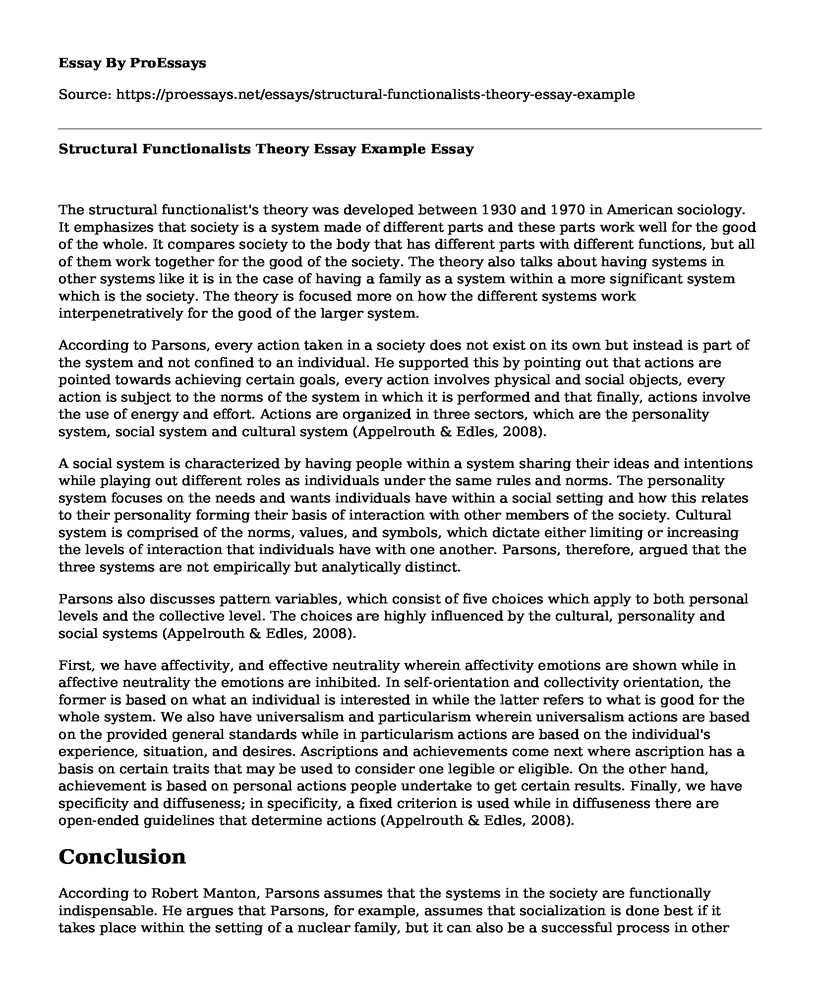The structural functionalist's theory was developed between 1930 and 1970 in American sociology. It emphasizes that society is a system made of different parts and these parts work well for the good of the whole. It compares society to the body that has different parts with different functions, but all of them work together for the good of the society. The theory also talks about having systems in other systems like it is in the case of having a family as a system within a more significant system which is the society. The theory is focused more on how the different systems work interpenetratively for the good of the larger system.
According to Parsons, every action taken in a society does not exist on its own but instead is part of the system and not confined to an individual. He supported this by pointing out that actions are pointed towards achieving certain goals, every action involves physical and social objects, every action is subject to the norms of the system in which it is performed and that finally, actions involve the use of energy and effort. Actions are organized in three sectors, which are the personality system, social system and cultural system (Appelrouth & Edles, 2008).
A social system is characterized by having people within a system sharing their ideas and intentions while playing out different roles as individuals under the same rules and norms. The personality system focuses on the needs and wants individuals have within a social setting and how this relates to their personality forming their basis of interaction with other members of the society. Cultural system is comprised of the norms, values, and symbols, which dictate either limiting or increasing the levels of interaction that individuals have with one another. Parsons, therefore, argued that the three systems are not empirically but analytically distinct.
Parsons also discusses pattern variables, which consist of five choices which apply to both personal levels and the collective level. The choices are highly influenced by the cultural, personality and social systems (Appelrouth & Edles, 2008).
First, we have affectivity, and effective neutrality wherein affectivity emotions are shown while in affective neutrality the emotions are inhibited. In self-orientation and collectivity orientation, the former is based on what an individual is interested in while the latter refers to what is good for the whole system. We also have universalism and particularism wherein universalism actions are based on the provided general standards while in particularism actions are based on the individual's experience, situation, and desires. Ascriptions and achievements come next where ascription has a basis on certain traits that may be used to consider one legible or eligible. On the other hand, achievement is based on personal actions people undertake to get certain results. Finally, we have specificity and diffuseness; in specificity, a fixed criterion is used while in diffuseness there are open-ended guidelines that determine actions (Appelrouth & Edles, 2008).
Conclusion
According to Robert Manton, Parsons assumes that the systems in the society are functionally indispensable. He argues that Parsons, for example, assumes that socialization is done best if it takes place within the setting of a nuclear family, but it can also be a successful process in other kinds of families. He also criticizes the assumption that the subsystems in a system all put effort towards the good of the whole system which and therefore if a subsystem is dysfunctional it affects the whole system this may not be true because for example if a family breaks, this may not affect the whole society. Finally, the assumption that subsystems perform decisive action is deemed not to be true by Merton due to conflict perspectives in society (Appelrouth & Edles, 2008).
Reference
Appelrouth, S., & Edles, L.D. (2008). Classical and Contemporary Sociological Theory. California: Pine Forge Press.
Cite this page
Structural Functionalists Theory Essay Example. (2022, Dec 06). Retrieved from https://proessays.net/essays/structural-functionalists-theory-essay-example
If you are the original author of this essay and no longer wish to have it published on the ProEssays website, please click below to request its removal:
- Principles of Ethical Issues Essay Example
- The Role of Business in Society - Essay Sample
- Sociological Reasons for Increase in Child Poverty in Hong Kong Immigrant Families - Essay Sample
- Essay Sample on the Importance of Community in The Hate U Give
- Essay Example on Spoken vs Written Texts: Communicating Information With Sentences
- Suicide in Australia: Statistics and Causes - Paper Example
- Unraveling Climate Change: Impact on Weather, Cryosphere, Ocean Ecosystems, and Human Society







